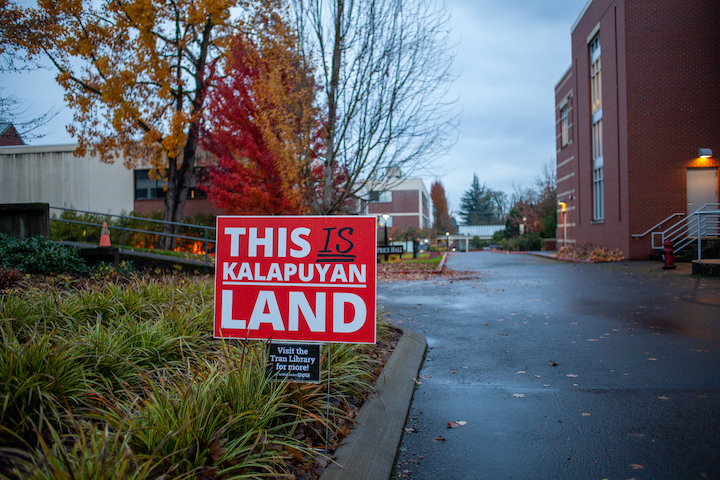Celebrate Indigenous Peoples’ Heritage in November
This month, Pacific University joins in celebrating the history, heritage and culture of Indigenous peoples during Indigneous Peoples Month, or Native American Heritage Month. Educational events planned this month range from a museum exhibit and online library display to a philosophy colloquium and movie screening.
Traveling Exhibition
 Pacific University Libraries presents a traveling exhibition Museum at (Our Place): This IS Kalapuyan Land, featuring contemporary Native American artwork curated by Steph Littlebird Fogel at Washington County's Five Oaks Museum. The exhibition prompts critical thinking around representation of Indigenous history and identity in non-Indigenous institutions. To achieve this Fogel added historical content from David G. Lewis, Phd, who is a preeminent scholar on Western Oregon tribes.
Pacific University Libraries presents a traveling exhibition Museum at (Our Place): This IS Kalapuyan Land, featuring contemporary Native American artwork curated by Steph Littlebird Fogel at Washington County's Five Oaks Museum. The exhibition prompts critical thinking around representation of Indigenous history and identity in non-Indigenous institutions. To achieve this Fogel added historical content from David G. Lewis, Phd, who is a preeminent scholar on Western Oregon tribes.
The interactive outdoor display connects participants to artwork and educational guides via QR codes on lawn signs. The display will go up soon around the Forest Grove Campus and is currently available to the public in downtown Hillsboro.
Visit Pacific University Libraries online to learn more about the Kalapuyan peoples, including history and recommended reading, the Forest Grove Indian Training School, and selected newer books written by Native American authors, grouped by genre.
Philosophy Colloquium
Students, staff, faculty and the public are invited to attend a philosophy colloquium Tuesday, Nov. 17 from 1 to 2:30 p.m titled, The Endangered Species Act and Colonial Conservation as Settler Logics of Erasure and Possession: Southern Resident Killer Whales and the Maunakea TMT. The discussion examines the impact of federal, state, and non-governmental organization conservation models on Indigenous sovereignty through the lens of conflicts surrounding the southern resident killer whales in the Salish Sea and the proposed Thirty Meter Telescope on Maunakea, uncovering how the Endangered Species Act (ESA) and its family of related policies designate species and habitats as ecological possessions of the United States and disregard the kinship relations of Indigenous nations.
Film Screening
Due to COVID-19 restrictions, this event has moved to online viewing. The Student Multicultural Center invites you to join a screening of Dakota 38, Saturday, Nov. 21 at 8 p.m. via Zoom ID: 914 8384 7594. Shun Wetlesen '22 will lead a discussion before and following the film. Dakota 38 was created in line with native healing practices. The creators of the film have made it available to screen as a gift rather than for sale.
Dakota 38 is a documentary that takes place in the spring of 2005 and follows Jim Miller, a Native spiritual leader and Vietnam veteran, as he finds himself dreaming about riding on horseback across the great plains of South Dakota. Just before he awoke, he arrived at a riverbank in Minnesota and saw 38 of his Dakota ancestors hanged. At the time, Jim knew nothing of the largest mass execution in U.S. history, ordered by Abraham Lincoln on Dec. 26, 1862. This is the story of Miller’s journey back with a group of riders to the hanging site on the anniversary of the execution — the blizzards they endure, the Native and non-Native communities that house and feed them along the way, and the dark history they are beginning to wipe away.
Support Grant
Earlier this fall, Pacific also received a $1.2 million grant from the U.S. Department of Education's Asian American Native American Pacific Islander Serving Institution (AANAPISI) program. Pacific was the first university in Oregon to earn the designation, and this is the first grant Pacific has received under the program. The funding will be used to support Supporting Inclusive Success, a coordinated initiative designed to improve retention, promote science, technology, engineering and math education, and provide tailored academic support to undergraduate students from underrepresented backgrounds.


